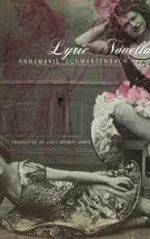

Univ. of Chicago Press, hardcover, 9780857420169
Lyric Novella is brief and delicate; it takes place in Weimar Berlin, and relates the story of a developing obsessive love by a young diplomat-to-be for Sibylle, a night club singer. The narrator seems to be a blank canvas; everything he does or thinks appears to be guided by his love for Sibylle. Yet even though he can be reckless or abandoning, even to the extent of ignoring his career, he does not pursue Sibylle aggressively or "woo" her seductively.
Lyric Novella was first published in 1933 Germany, and although Schwarzenbach insisted that the narrator is a young woman and not a young man, it seems likely that this assertion was originally suppressed or hidden. Yet in my reading of Lyric Novella, I found the gender of the narrator to be entirely unclear. For this reason I feel unable to enter into any discussion as to whether the novel was innovative for its time, since I did not detect while reading that it actually deals overtly with issues of gender and same sex relationships.
The title reveals little about the subject matter of the book although it suggests that the writing will involve poetic language and a narrative expressing a personal, perhaps romantic and emotional point of view. As a whole, Lyric Novella could be accurately described as an intense outpouring of emotion. The narrative is at times recounted as a stream of consciousness with intense focus upon Sibylle, broken up by short chapters, or vignettes; for example,
I'd say that I don't know, I don't give her thought, but I never forget her for a single second. It is as if I have never lived without her. Nothing connects us, but I am charged with her presence, sometimes I remember her breaths or the smell of her skin, and it is as if I am still holding her in my arms, as if she is sitting next to me and I need only stretch out my hand to touch her. But what is there to connect us: these long evenings, these long nights, this parting outside her door in the paling morning, these endless solitudes—
The structure of the narrative comprises very short chapters that alternate between the narrator's reflections on his love for Sibylle and his subsequent stay outside Berlin. These alternating chapters tended to disengage me as a reader, perhaps because I never felt immersed in the narrator's feelings. The plot itself is relatively uneventful, and this also does not assist in engaging the reader.
From its beautiful covers to its long introduction, this new publication of Lyric Novella is advanced as an innovative novel of the 1930s dealing with a same sex relationship. I am struggling to recommend this book to others as I did not find it to be an accessible or a particularly engaging story; in fact, I found that the novel left no impression in its wake, except a vague memory of the narrator's obsession. I may have missed the real meaning of this book, but it seems to me less than obvious, on the face of it, that this novel was at all cutting edge for its time.
